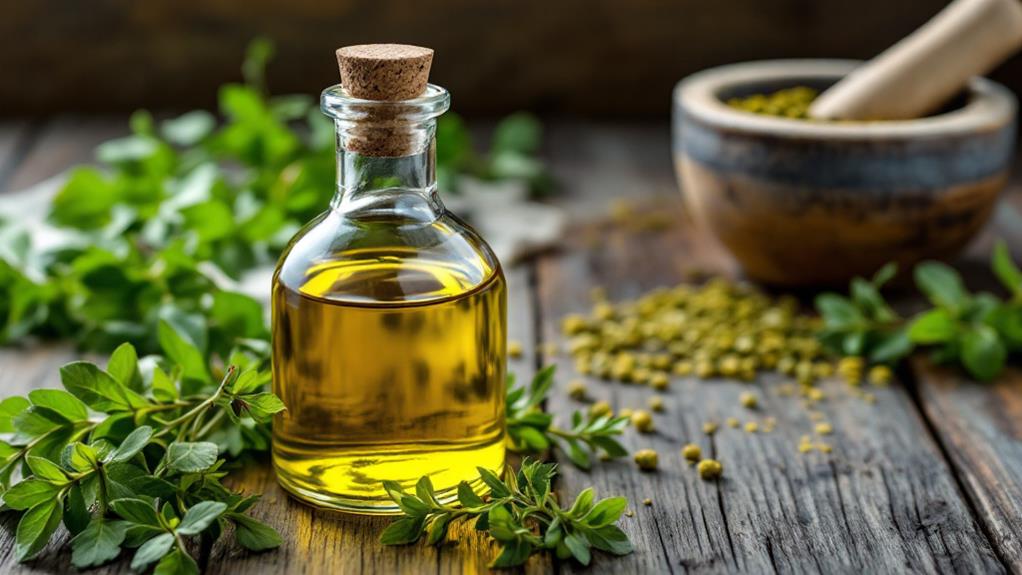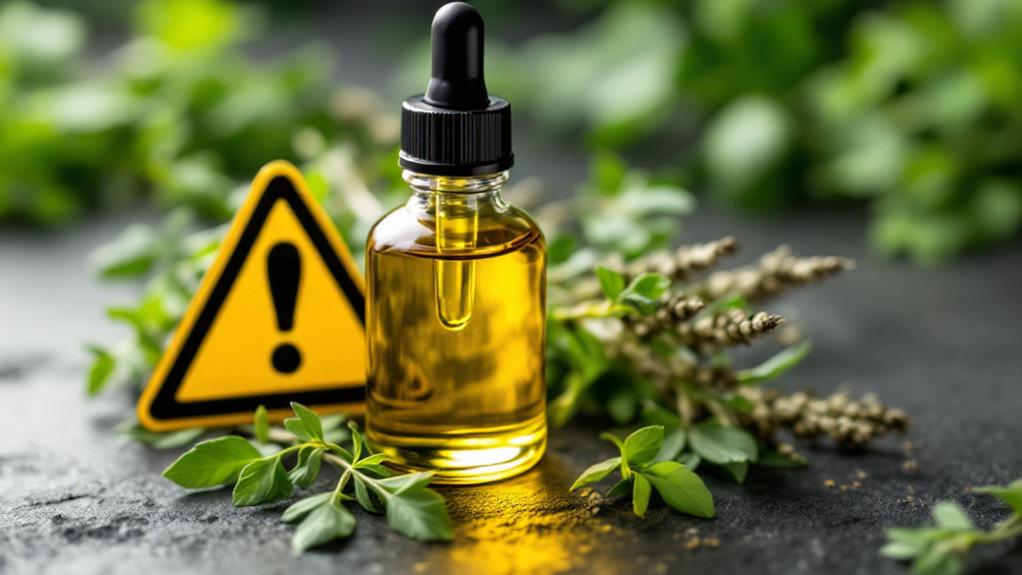What Is Oregano Oil? Health Benefits and How to Use It

Oregano oil, extracted from Origanum vulgare, is packed with powerful compounds like carvacrol and thymol. It's known for its strong antibacterial and antifungal properties, working against even antibiotic-resistant bacteria. This oil is also rich in antioxidants, helping combat oxidative stress and support your immune system. To use, consider taking it orally for gut health or apply it topically (diluted with a carrier oil) to treat skin issues. Keep in mind possible side effects such as gastrointestinal discomfort and interactions with medications. Stay informed on how oregano oil can further improve your health and wellness path.
Understanding Oregano Oil
Oregano oil's rich profile makes it a powerhouse in natural health remedies. Extracted from the leaves of Origanum vulgare, it's packed with beneficial compounds like carvacrol and thymol, which give it remarkable antimicrobial properties. This vital oil isn't just another kitchen staple; it's a potent tool in promoting health benefits, especially for those grappling with diverse infections. Carvacrol, a major component, plays a significant role in fighting antibiotic-resistant bacteria, including the notorious Staphylococcus aureus.
When it comes to gastrointestinal health, oregano oil can be a game-changer. Its antifungal properties are particularly effective against Candida albicans, a common fungus. Furthermore, if you're dealing with small intestine bacterial overgrowth (SIBO), oregano oil may provide relief by balancing your gut flora due to its antibacterial action.
However, don't overlook the dosage. Oregano oil is highly potent, so you should always adhere to recommended amounts and consult your healthcare provider to prevent adverse effects. Remember, vital oil forms are meant for topical use and must be diluted, while liquid extracts and capsules are suitable for internal use. Use oregano oil wisely and enjoy its numerous health benefits.
Health Benefits Overview
Many people find oregano oil to be a flexible supplement to their health regimen thanks to its impressive range of benefits. You'll find that oregano oil is packed with antioxidant properties, primarily due to compounds like carvacrol and thymol. These antioxidants help stabilize free radicals, potentially reducing oxidative stress in your body, which is essential for maintaining general health.
In terms of antibacterial effects, oregano oil stands out for its ability to combat antibiotic-resistant bacteria, such as Staphylococcus aureus. This positions it as a promising natural remedy for different infections. However, it doesn't stop there; oregano oil also boasts strong antifungal properties. If you're dealing with yeast infections, particularly those caused by Candida albicans, oregano oil may offer some relief.
For those struggling with inflammatory conditions, oregano oil might provide some comfort. Its anti-inflammatory properties can help alleviate symptoms associated with issues like irritable bowel syndrome (IBS). Moreover, preliminary research hints at oregano oil's cancer-fighting properties, showing potential against lung and breast cancer cells. While these findings are promising, more human studies are necessary to confirm these effects. In summary, oregano oil's multifaceted health benefits make it a valuable enhancement to your wellness toolkit.
Antibacterial and Antifungal Properties

One area where oregano oil truly shines is in its antibacterial and antifungal properties. Thanks to its high content of carvacrol, oregano oil is particularly effective against antibiotic-resistant bacteria like Staphylococcus aureus. This makes it a powerful ally in combating infections that don't respond well to conventional treatments. The antimicrobial effects of oregano oil extend to other bacteria, such as E. coli and Pseudomonas aeruginosa, making it a valuable tool for food preservation and ensuring safety.
Oregano oil's antifungal properties are similarly impressive. It shows significant effectiveness against Candida albicans, a common culprit behind yeast infections and other fungal issues. This makes it a natural option for those seeking relief from these conditions. Additionally, research has highlighted oregano oil's potential as a topical antifungal treatment, particularly for nail fungus. In 2020, a study demonstrated its ability to improve nail conditions, underscoring the oil's practical applications.
Incorporating oregano oil into your routine can offer substantial health benefits by leveraging its potent antibacterial and antifungal capabilities. Regardless of whether you're looking to safeguard your food or address fungal infections, oregano oil's versatile properties make it a compelling choice.
Antioxidant Effects
Among its many impressive attributes, oregano oil stands out for its potent antioxidant effects. Packed with powerful antioxidants like carvacrol and thymol, oregano oil plays a significant role in neutralizing free radicals and preventing oxidative stress in your body. This is important because oxidative stress can lead to cell damage, which is often linked to aging and various chronic diseases.
In fact, a study ranked oregano as having the highest antioxidant content among 39 herbs. It even surpasses many fruits and vegetables in its ability to combat oxidative damage. By stabilizing free radicals, oregano oil helps protect your cellular integrity, reducing the risk of chronic diseases. This means that incorporating oregano oil into your routine can improve your general health benefits.
Moreover, the antioxidants in oregano oil support your immune function, contributing to your body's natural defenses against illnesses. Regular consumption of oregano oil can increase your body's antioxidant levels, providing an added shield against cell damage. This makes it a valuable inclusion in your wellness regimen, helping you maintain ideal health and liveliness. With its powerful protective properties, oregano oil is a standout choice for enhancing your body's resilience.
Inflammation Reduction

Oregano oil not only excels in antioxidant support but also offers significant benefits in reducing inflammation. Thanks to the compound carvacrol, oregano oil effectively inhibits inflammatory molecules, potentially mitigating inflammation throughout your body. This can be particularly beneficial if you're dealing with conditions like arthritis, as carvacrol has been shown to lower inflammation markers, providing relief from painful symptoms.
The anti-inflammatory effects extend beyond just arthritis. If you're recovering from an injury, oregano oil may aid in your recovery process. Animal research suggests it can help reduce the inflammation associated with injuries, speeding up your healing time. Additionally, the antioxidant properties of oregano oil stabilize free radicals, which may help ward off chronic inflammation-related diseases.
Interestingly, if you're concerned about obesity prevention, oregano oil might be a valuable ally. Research indicates that it can reduce the inflammation associated with fat tissue accumulation, potentially helping prevent obesity. Incorporating oregano oil into your routine could offer a range of health benefits, from combating chronic inflammation to supporting general well-being. By leveraging its powerful properties, you're taking a proactive step in maintaining your health.
Safety and Dosage
In relation to using oregano oil, safety and proper dosage are fundamental. You should always follow the manufacturer's recommendations for consumption since there's no established upper limit. Exceeding these guidelines might increase the risk of side effects. It's important to consult a healthcare provider before starting oregano oil, especially if you're on medications, pregnant, nursing, or have pre-existing health conditions. This guarantees that oregano oil use is safe for you.
Keep in mind that side effects can occur. They may include gastrointestinal discomfort, nausea, vomiting, and skin irritation. Conduct a patch test before topical application to check for allergic reactions. Always dilute oregano essential oil with a carrier oil, like coconut or olive oil, for topical use. A common dilution is about 1%. Remember, oregano essential oil is not safe for consumption.
Monitoring for adverse reactions is significant. If you notice any negative symptoms, discontinue use immediately. Regularly assess how your body responds, and don't hesitate to adjust your dosage accordingly. Keeping these safety measures in mind guarantees that you can enjoy the potential benefits of oregano oil without unnecessary risks.
Drug Interactions

When considering the use of oregano oil, it's vital to understand how it might interact with other medications. Oregano oil, with its health benefits, also comes with some potential drug interactions. If you're on blood thinners like warfarin, be cautious. Oregano oil can improve the bleeding risk due to its natural anticoagulant properties. This isn't just limited to medications; it may also increase bleeding risks when combined with herbs like garlic, ginger, or ginkgo.
Moreover, if you have diabetes, combining oregano oil with diabetes medications can lead to hypoglycemia, as it may lower blood sugar levels further. It's significant to be aware of how these interactions could affect your health.
Additionally, oregano oil might interfere with the absorption of vital minerals such as copper, iron, and zinc if you're taking supplements. This could lead to potential deficiencies.
Here's what you should remember:
- Increased bleeding risk with blood thinners and certain herbs.
- Potential hypoglycemia if taken with diabetes medications.
- Possible mineral deficiencies due to decreased absorption.
- Amplified effects with other anticoagulant herbs.
- Careful monitoring of your health is paramount.
Considering these factors will help you make informed decisions about using oregano oil safely.
Topical and Oral Use
While considering potential drug interactions, it's also essential to know how to properly use oregano oil both topically and orally. When using oregano oil topically, always dilute it with a carrier oil like olive or coconut oil. Aim for about 1-2 drops of oregano oil per teaspoon of carrier oil. This prevents skin irritation, especially given its highly concentrated nature. Before full application, perform a patch test to confirm you don't experience allergic reactions, particularly if you have sensitive skin.
For oral use, oregano oil can be beneficial for gut health and enhancing immune function. Its antibacterial properties are notable, especially against antibiotic-resistant bacteria. You can find oregano oil in capsules or liquid form, but it's important to follow the manufacturer's instructions or consult a healthcare provider for proper dosages. This guarantees you're maximizing its health benefits without risking adverse effects.
Potential Side Effects

Although oregano oil offers numerous health benefits, it's vital to be aware of its potential side effects. Consuming oregano oil in high amounts can lead to gastrointestinal discomfort, such as nausea, vomiting, and diarrhea. If you're using it topically, keep in mind that applying it without proper dilution might cause skin irritation or even allergic reactions. Always perform a patch test if you have sensitive skin. Pregnant or breastfeeding individuals should steer clear of oregano oil due to the lack of clear safety data regarding its effects during these significant periods.
Additionally, oregano oil can interact with certain medications. If you're taking blood thinners or diuretics, oregano oil might increase the risk of bleeding or affect your medication's efficacy. Overconsumption is another concern, as it may lead to dizziness and headaches. It's important to adhere to the recommended dosages to avoid these issues.
Consider these risks:
- Gastrointestinal discomfort: nausea, vomiting, diarrhea
- Skin irritation: rash, allergic reactions
- Pregnant or breastfeeding concerns: avoid use
- Medication interactions: blood thinners, diuretics
- Overconsumption effects: dizziness, headaches
Stay informed to safeguard your health and safety while using oregano oil.




